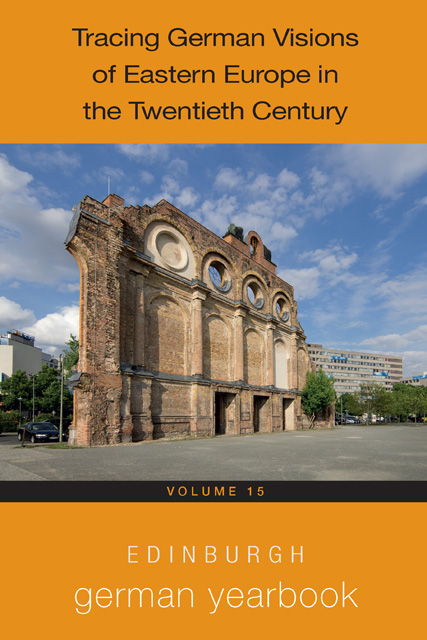Book contents
- Frontmatter
- Contents
- Miscellaneous Frontmatter
- Between Estrangement and Entanglement: An Introduction to German Visions of Eastern Europe in the Twentieth (and Twenty-First) Century
- Colonizing a Central European City: Transnational Perspectives on Kronstadt/Braşov/Brassó in the First Half of the Twentieth Century
- Exile as a Literary-Political Mission: Leo Katz’s Antifascist Bukovina Novel Totenjäger (1944)
- Brunnenland: The Image of the Bukovina in Paul Celan
- “Auch bei uns im fernen Transsilvanien”: The Transylvanian Saxons and the Long Shadow of the Third Reich in the Work of Bettina Schuller
- Through an Orientalist Lens: Colonial Renderings of Poland in German Cinema after 1989
- The Nazi Ghost and the Sinti Woman in Kerstin Hensel’s Bell Vedere (1982)
- The Haunted Landscape of Babi Yar: Memory, Language, and the Exploration of Holocaust Spaces in Katja Petrowskaja’s Vielleicht Esther (2014)
- “dann hüpfe ich auch, komisch und ungeschickt, wie eine Nadel auf einer abgespielten Platte …”: Translational Ethics and Affects in Katja Petrowskaja’s Vielleicht Esther (2014)
- Expanding the Nationalgeschichte: Multidirectional European Memory in Nino Haratischwili and Saša Stanišić
- Reading Photographic Images and Identifying Mnemonic Threads of the Post-Memorial Project in Sie kam aus Mariupol (2017) by Natascha Wodin
- Navid Kermani’s Entlang den Gräben (2018) and Its Readers: Remapping Europe’s East
- Notes on the Contributors
“dann hüpfe ich auch, komisch und ungeschickt, wie eine Nadel auf einer abgespielten Platte …”: Translational Ethics and Affects in Katja Petrowskaja’s Vielleicht Esther (2014)
Published online by Cambridge University Press: 11 January 2023
- Frontmatter
- Contents
- Miscellaneous Frontmatter
- Between Estrangement and Entanglement: An Introduction to German Visions of Eastern Europe in the Twentieth (and Twenty-First) Century
- Colonizing a Central European City: Transnational Perspectives on Kronstadt/Braşov/Brassó in the First Half of the Twentieth Century
- Exile as a Literary-Political Mission: Leo Katz’s Antifascist Bukovina Novel Totenjäger (1944)
- Brunnenland: The Image of the Bukovina in Paul Celan
- “Auch bei uns im fernen Transsilvanien”: The Transylvanian Saxons and the Long Shadow of the Third Reich in the Work of Bettina Schuller
- Through an Orientalist Lens: Colonial Renderings of Poland in German Cinema after 1989
- The Nazi Ghost and the Sinti Woman in Kerstin Hensel’s Bell Vedere (1982)
- The Haunted Landscape of Babi Yar: Memory, Language, and the Exploration of Holocaust Spaces in Katja Petrowskaja’s Vielleicht Esther (2014)
- “dann hüpfe ich auch, komisch und ungeschickt, wie eine Nadel auf einer abgespielten Platte …”: Translational Ethics and Affects in Katja Petrowskaja’s Vielleicht Esther (2014)
- Expanding the Nationalgeschichte: Multidirectional European Memory in Nino Haratischwili and Saša Stanišić
- Reading Photographic Images and Identifying Mnemonic Threads of the Post-Memorial Project in Sie kam aus Mariupol (2017) by Natascha Wodin
- Navid Kermani’s Entlang den Gräben (2018) and Its Readers: Remapping Europe’s East
- Notes on the Contributors
Summary
Across academy and industry, theory and practice, translation is increasingly understood to be a “cluster concept.” In other words, this fuzzy term encompasses a broad spectrum of practices that are inherently interdisciplinary, versatile, open-ended, and collaborative. Katja Petrowskaja’s translingual autofiction Vielleicht Esther (2014; Maybe Esther, 2019) likewise resists easy definition. Presenting readers with a patchwork of genres and languages, it weaves together diverse interdisciplinary strands, from historical documentation and autobiographical introspection to philological and philosophical meditation. At times, these pursuits appear contradictory, and Petrowskaja knowingly frustrates our desire for a historical work that demystifies. Her hydra-headed “Text des Nachgedächtnisses” (text of postmemory) is only incidentally a travelogue, only superficially a family history, and only tangentially a novel; it betrays diffuse personal, authorial and translational desires, since her practice is led by conflicting urges to disentangle threads and to multiply entanglements. In a series of interconnected narrative fragments, the first-person narrator (also named Katja) sets off from Berlin to venture across Central and Eastern Europe, gathering traces of her ancestors who were murdered in the Holocaust. Petrowskaja is a Ukrainian Jew born twenty-five years after the end of the Second World War, who has since married a German, migrated to Germany, and ostensibly integrated into German culture and language. She admits that her knowledge of German far outstrips her grasp of Yiddish or Hebrew. Her historical investigation is simultaneously a linguistic adventure. As she traverses ghostly landscapes across Poland, Ukraine, and Austria, visiting concentration camps, mass graves, museums, archives, and memorials, Katja is constantly translating. Her self-conscious, translingual narration offers a poignant commentary on the challenges and opportunities arising from linguistic contact. The translational hurdles she encounters reflect the shifting borders, bodies, languages, and ideologies that constitute Europe’s hybridity, particularly Central and Eastern Europe over the last century. Each stop on her journey provides clues, but also poses further questions. Cities like Kyiv and Berlin sustain multiple conflicting memories and evoke contradictory associations that complicate the traditional binary between the foreign and the familiar, rendering the very notion of Heimat (homeland) irrevocably unheimlich (eery/uncanny). German, Russian, Ukrainian, English, Polish, Yiddish, and Hebrew terms surface unexpectedly.
- Type
- Chapter
- Information
- Edinburgh German Yearbook 15Tracing German Visions of Eastern Europe in the Twentieth Century, pp. 194 - 223Publisher: Boydell & BrewerPrint publication year: 2022



